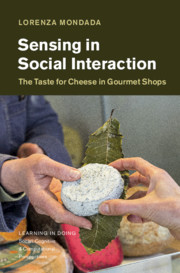Book contents
- Sensing in Social Interaction
- Learning in Doing: Social, Cognitive, and Computational Perspectives
- Sensing in Social Interaction
- Copyright page
- Contents
- Figures
- Tables
- Extracts
- Acknowledgments
- Part I Sensoriality in Interaction
- Part II Looking and Knowing
- Part III Sensing Together
- Part IV Tasting, Assessing, and Making Decisions
- 7 Requests and Offers to Taste: The Sequential Environments of Tasting
- 8 The Anatomy of Tasting
- 9 The Outcome of Tasting: Assessing and Decision-Making
- 10 Conclusion
- Appendix: Transcription Conventions
- Bibliography
- Index
- Series page
7 - Requests and Offers to Taste: The Sequential Environments of Tasting
from Part IV - Tasting, Assessing, and Making Decisions
Published online by Cambridge University Press: 21 October 2021
- Sensing in Social Interaction
- Learning in Doing: Social, Cognitive, and Computational Perspectives
- Sensing in Social Interaction
- Copyright page
- Contents
- Figures
- Tables
- Extracts
- Acknowledgments
- Part I Sensoriality in Interaction
- Part II Looking and Knowing
- Part III Sensing Together
- Part IV Tasting, Assessing, and Making Decisions
- 7 Requests and Offers to Taste: The Sequential Environments of Tasting
- 8 The Anatomy of Tasting
- 9 The Outcome of Tasting: Assessing and Decision-Making
- 10 Conclusion
- Appendix: Transcription Conventions
- Bibliography
- Index
- Series page
Summary
As seen for touch and smell, the closer sensorial access to the materiality of the product is characterized by an orientation of all participants to the normativity of sensorial practices, which might be forbidden – for reasons of hygiene and for preserving the integrity of the product – but also permitted – when that is relevant for the progression into the selling encounter. In the case of tasting, the customer either requests to taste or is offered to taste. Tasting as a sensorial access to the object supposes its ingestion and therefore its destruction: this practical problem is solved by the seller cutting a tiny sample from a bigger piece and giving it to the customer. The chapter explores the distinctive circumstances in which tasting is requested and offered and their consequences for the next actions, explored in Chapter 8. In particular, it focuses on the sequential environments in which offers to taste are produced by the seller, which connect back to some epistemic features emerging at the very beginning of the purchase (explored in Chapters 3 and 4).
Information
- Type
- Chapter
- Information
- Sensing in Social InteractionThe Taste for Cheese in Gourmet Shops, pp. 313 - 353Publisher: Cambridge University PressPrint publication year: 2021
